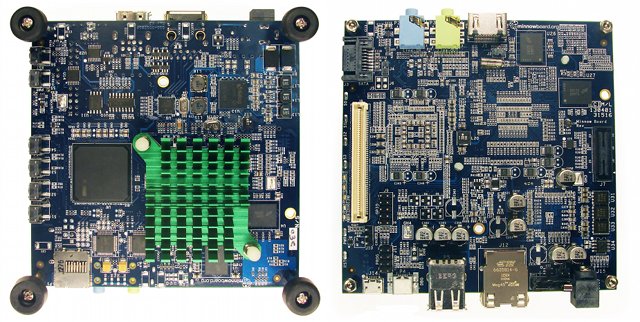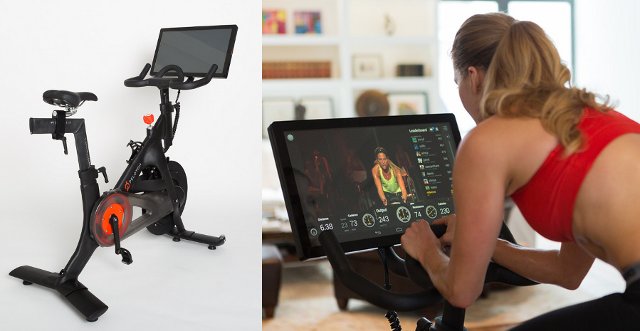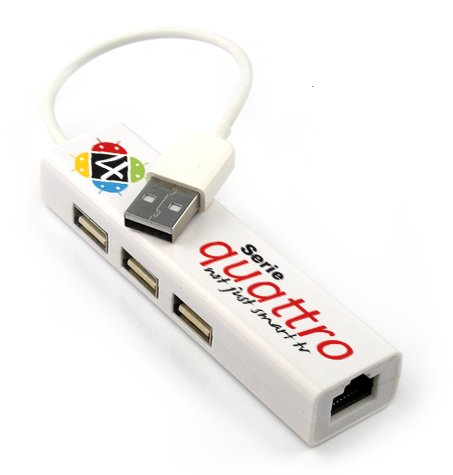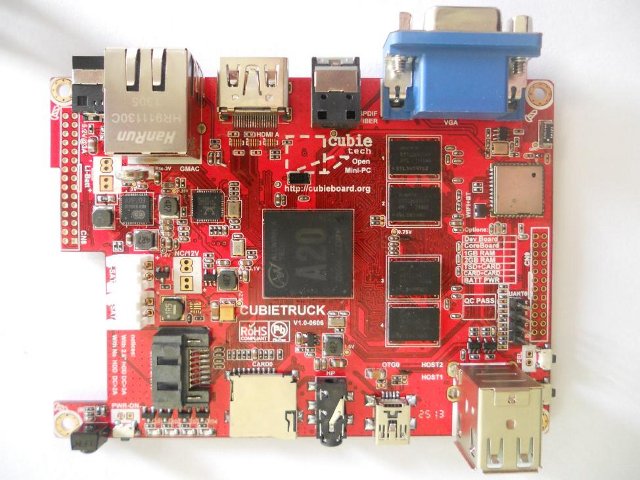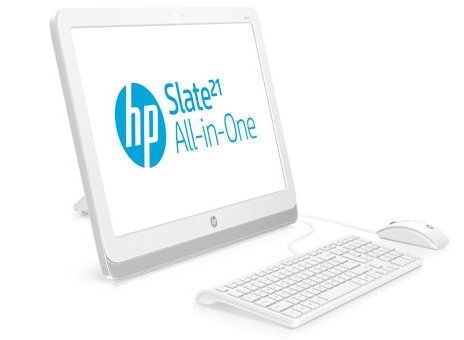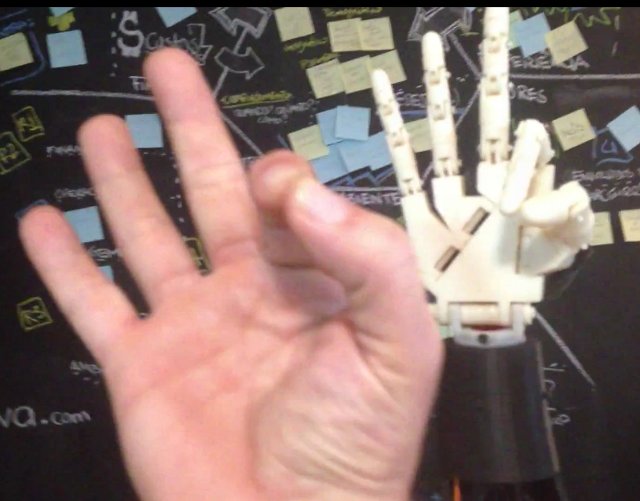Linaro 13.06 has been released with Linux Kernel 3.10-rc6 and Android 4.2.2. Linux Linaro Stable (LSK) preview is based on kernel 3.9.6. There seems to have been a lot of activity for the LAVA and Builds and Integration teams, with LAVA support for new SoC such as Huawei K3V2 and Broadcom Capri from 2 companies which have recently joined Linaro as members, and well as continuous build for Linaro Stable Kernel. On the kernel side, more work has been done for multi-platform support (unified kernel), uprobes, eMMC power mamangement, and more. Here are the highlights of this release: LAVA LAVA Core As part of the effort to improve the developer experience with LAVA, the different client tools were consolidated into a single package, which simplifies the process of updating the tools and makes it easier for the team to provide new features for LAVA users. LAVA now supports KVM devices, […]
MINIX MINI HD PC Based on Intel Atom D2550 Sells for $119
MINIX MINI HD PC is a barebone x86 computer without RAM or hard disk that has been announced last year, and it has just come to my attention that the system sells for just $119 on Geekbuying (excluding shipping), so once you add (up to 4GB) DDR3 RAM, and a SATA hard drive, you may have a basic x86 Linux or Windows system for about $200. MINIX MINI HD PC specifications: CPU – Intel dual-core (4 threads) D2550 processor @ 1.86GHz Chipset – Intel NM10 GPU – Intel GMA 3600 Series System Memory – 2x 1.5V DDR3 @ 800/1066MHz SO-DIMM sockets supporting up to 4GB of system memory (GeekBuying reports that “8GB (4GB x 2) memory is supported unofficially, stability will not be guaranteed by Intel”) BIOS – 1 x 16Mbit flash with AMI BIOS. Supports Plug & Play, Advanced Power Management ACPI, STR, CPU temperature, Fan speed, System Voltage […]
$199 Minnowboard is an Open Source Embedded Board Powered By Intel Atom E640 Processor
Minnowboard is a development board designed by Intel’s Open Source Technology Center, powered by Intel Atom E640 processor @ 1GHz with 1GB RAM, SATA2 and Gigabit Ethernet support, and several embedded I/O such as SPI, I2C and CAN, and that ships with Angstrom Linux distribution. Minnoboard Specifications: Processor – Intel Atom E640 @ 1GHz (32bit) Chipset – EG20T Intel Platform Controller Hub GPU – Integrated Intel Graphics Media Accelerator (GMA) 600 System Memory – 1 GB DDR2 RAM Storage – 4 MB SPI Flash (for Firmware), micro SD card slot and SATA Video Output – SDVO to DVI (over HDMI connector) Audio – 1/8″ (3.5mm??) jack line Input and Output I/O: 1x SATA2 3Gb/sec 2x USB host ports + 1x micro USB device 1x Serial debug via Serial (UART 0) to USB conversion (mini-USB-B port) 10/100/1000 Ethernet PCI Express Expansions: 8x Buffered GPIO pins 2x GPIO controlled LEDs 4x GPIO […]
Android Now Comes to Exercise Bikes thanks to The Peloton Bike
Beyond smartphones and tablets, Android is now running in a number of others devices such as cars, watches, set-top boxes and more, but Android should soon enter the gym, or rather bring the gym to your home, with the Peloton Bike, an exercise bike that comes with a 21.5″ touchscreen powered by Texas Instruments OMAP4 and running Android 4.1. Here are Peloton bike panel’s specifications: SoC – Texax Instruments OMAP 4470 dual-core Cortex A9 @ 1.5GHz System Memory – 1GB RAM Storage – 16GB internal flash Display – 21.5″ PCAP (projected capacitive) multitouch display (1080p resolution). Sweat resistant. Connectivity: 802.11 b/g/n Wi-Fi ANT+ wireless Bluetooth 4.0 10/100 Ethernet Audio – 3.5mm TRRS headphone and mic jack, 2x 3 watt stereo speakers Camera – 1.3MP front camera Misc – Peloton Cycle data connector as well as the key features of the bike itself: Carbon steel and aluminum monocoque frame Neodymium rare […]
Ethernet & USB Hub Combo for Android Mini PCs
The first time I saw a USB & Ethernet hub was the one that comes with SmartCandy mini PC, but I never thought of checking if they sold such item separately until this morning, as I’ve noticed that Asiapads is selling a “Zero Devices Hub” with 3 USB 2.0 ports and a 10/100M Ethernet RJ45 connector. Of course, you could always get a standard USB hub plus an external Ethernet USB dongle, but an all-in-one solution maybe more convenient for some people. Zero Device Hub sells for $14.99, and is said to be compatible with Android mini PCs such as Z4C and Z2C. I’ve also looked on DealExtreme, and there’s one device with the same features for $11.90, but according to users’ reviews it’s not compatible with Android. The same device is also available for $7 and up on Aliexpress. The Ethernet part is apparently based on DM9601, which works in […]
Cubietruck Development Board Features AllWinner A20 SoC, 2GB RAM, and Gb Ethernet
When Cubietech announced the availability of the Cubieboard2 last week, some people seemed disappointed it only came with 1GB RAM and no Gigabit Ethernet. We already knew a board called Cubietruck was in the work with those features, but work has gone faster than I expected as pictures of the Cubietruck board are already available. Instead of simply listing the specifications, I’ll show a comparison table of the specifications against Cubieboard2. Cubietruck Cubieboard2 SoC AllWinner A20 Dual-Core ARM Cortex-A7 with Mali400 MP2 AllWinner A20 Dual-Core ARM Cortex-A7 with Mali400 MP2 System Memory 1GB or 2GB DDR3@480MHz 1GB DDR3@480MHz Storage SATA 2.0 interface + NAND + Micro SD slot (or 2x micro Sd slot) SATA 2.0 interface + 4GB NAND flash + micro SD slot, Video Output Connectors HDMI & VGA HDMI Audio I/O 1x TOSLINK (Optical SPDIF), 1x headphone jack 1x headphone jack, 1x line in Connectivity 10M/100M/1G Ethernet 10M/100M […]
HP Unveils Slate 21 AIO Android PC and Tablet with a 21.5″ Touchscreen
Hewlett Packard has announced an all-in-one desktop PC in Beijing featuring a 21.5″ touch screen that ships with Android 4.2.2 instead of the usual (for dekstop PCs) Windows 8 operating system. It’s a concept we’ve seen before with devices such as Frontier FT103, but HP Slate 21 AIO is much more powerful with Nvidia Tegra 4 quad core cortex A15 against the TI OMAP4 used in the Frontier PC. HP Slate 21 AIO (partial) specifications: SoC – Nvidia Tegra 4 quad core Cortex A15 processor System Memory – Unknown Storage – 8GB memory + SD card slot Display – 21.5″ 10-point capacitive touchscreen IPS display with 1920×1080 resolution Connectivity – Wi-Fi Direct and BT 3.0. Camera – Front-facing webcam USB – 3x USB 2.0 Host ports Audio – Stereo speakers, DTS audio. That’s all we know at this time, but since we can also connect a USB keyboard and mouse, […]
Open Source Prosthetic Arm Controlled By Muscle Movements
Gustavo Brancante is working on a very interesting project that let you control a prosthetic arm with your muscle movement using open source technology with InMoov Hand (which can be 3D printed), Arduino Uno R3, and Olimex Electrocardiography electromiography shield (SHIELD-EKG-EMG). This is called a Myo-Electric Prosthesis. Gabriel wrote a tutorial to use his “open arm” which I’ll summarize here. On the hardware front, you’ll also need a UDP compatible Wifi Shield configured as a UDP server with a fixed IP in the same LAN as the smartphone, and 57600 bps. TouchOSC (for smartphone and Workstation) is used with the following layout for calibration and feature selection. Finally load the program below to your Arduino board: Once everything is connected together, you should be able to do that: The demo looks impressive, but this is still work in progress, and next step will be to use a four channel EMG instead […]




